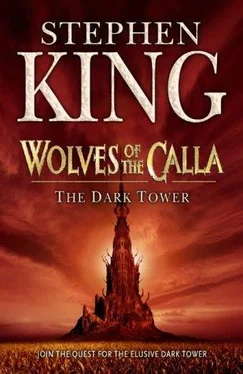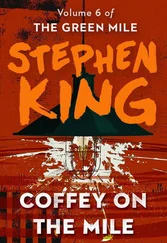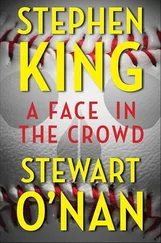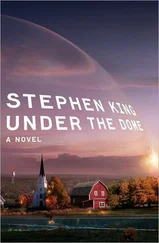"Naw, the King was a Mis'sippi boy," Eddie said, low.
Tian turned in his saddle to look at him. "Beg your pardon, sai?"
Eddie, not aware that he'd spoken aloud, said: "I'm sorry. I was talking to myself."
Andy the Messenger Robot (Many Other Functions) came striding back up the path from ahead of them in time to hear this. "Those who hold conversation with themselves keep sorry company. This is an old saying of the Calla, sai Eddie, don't take it personally, I beg."
"And, as I've said before and will undoubtedly say again, you can't get snot off a suede jacket, my friend. An old saying from Calla Bryn Brooklyn."
Andy's innards clicked. His blue eyes flashed. " Snot : mucus from the nose. Also a disrespectful or supercilious person. Suede : this is a leather product which-"
"Never mind, Andy," Susannah said. "My friend is just being silly. He does this quite frequently."
"Oh yes," Andy said. "He is a child of winter. Would you like me to tell your horoscope, Susannah-sai? You will meet a handsome man! You will have two ideas, one bad and one good! You will have a dark-haired-"
"Get out of here, idiot," Overholser said. "Right into town, straight line, no wandering. Check that all's well at the Pavilion. No one wants to hear your goddamned horoscopes, begging your pardon, Old Fella."
Callahan made no reply. Andy bowed, tapped his metal throat three times, and set off down the trail, which was steep but comfortingly wide. Susannah watched him go with what might have been relief.
"Kinda hard on him, weren't you?" Eddie asked.
"He's but a piece of machinery," Overholser said, breaking the last word into syllables, as if speaking to a child.
"And he can be annoying," Tian said. "But tell me, sais, what do you think of our Calla?"
Roland eased his horse in between Eddie's and Callahan's. "It's very beautiful," he said. "Whatever the gods may be, they have favored this place. I see corn, sharproot, beans, and… potatoes? Are those potatoes?"
"Aye, spuds, do ya," Slightman said, clearly pleased by Roland's eye.
"And yon's all that gorgeous rice," Roland said.
"All smallholds by the river," Tian said, "where the water's sweet and slow. And we know how lucky we are. When the rice comes ready-either to plant or to harvest-all the women go together. There's singing in the fields, and even dancing."
"Come-come-commala," Roland said. At least that was what Eddie heard.
Tian and Zalia brightened with surprise and recognition. The Slightmans exchanged a glance and grinned. "Where did you hear The Rice Song?" die Elder asked. "When?"
"In my home," said Roland. "Long ago. Come-come-commala, rice come a-falla." He pointed to the west, away from the river. "There's the biggest farm, deep in wheat. Yours, sai Overholser?"
"So it is, say thankya."
"And beyond, to the south, more farms… and then the ranches. That one's cattle… that one sheep… that one cattle… more cattle… more sheep…"
"How can you tell the difference from so far away?" Susannah asked.
"Sheep eat the grass closer to the earth, lady-sai," Overholser said. "So where you see the light brown patches of earth, that's sheep-graze land. The others-what you'd call ocher, I guess-that's cattle-graze."
Eddie thought of all the Western movies he'd seen at the Majestic: Clint Eastwood, Paul Newman, Robert Redford, Lee Van Cleef. "In my land, they tell legends of range-wars between the ranchers and the sheep-farmers," he said. "Because, it was told, the sheep ate the grass too close. Took even the roots, you ken, so it wouldn't grow back again."
"That's plain silly, beg your pardon," Overholser said. "Sheep do crop grass close, aye, but then we send the cows over it to water. The manure they drop is full of seed."
"Ah," Eddie said. He couldn't think of anything else. Put that way, the whole idea of range wars seemed exquisitely stupid.
"Come on," Overholser said. "Daylight's wasting, do ya, and there's a feast laid on for us at the Pavilion. The whole town'll be there to meet you."
And to give us a good looking-over, too , Eddie thought.
"Lead on," Roland said. "We can be there by late day. Or am I wrong?"
"Nup," Overholser said, then drove his feet into his horse's sides and yanked its head around (just looking at this made Eddie wince). He headed down the path. The others followed.
Eddie never forgot their first encounter with those of the Calla; that was one memory always within easy reach. Because everything that happened had been a surprise, he supposed, and when everything's a surprise, experience takes on a dreamlike quality. He remembered the way the torches changed when the speaking was done-their strange, varied light. He remembered Oy's unexpected salute to the crowd. The upturned faces and his suffocating panic and his anger at Roland. Susannah hoisting herself onto the piano bench in what the locals called the musica . Oh yeah, that memory always. You bet. But even more vivid than this memory of his beloved was that of the gunslinger.
Of Roland dancing.
But before any of these things came the ride down the Calla's high street, and his sense of forboding. His premonition of bad days on the way.
They reached the town proper an hour before sunset. The clouds parted and let through the day's last red light. The street was empty. The surface was oiled dirt. The horses' hooves made muffled thuds on the wheel-marked hardpack. Eddie saw a livery stable, a place called the Travelers' Rest that seemed a combination lodging-house and eating-house, and, at the far end of the street, a large two-story that just about had to be the Calla's Gathering Hall. Off to the right of this was the flare of torches, so he supposed there were people waiting there, but at the north end of town where they entered there were none.
The silence and the empty board sidewalks began to give Eddie the creeps. He remembered Roland's tale of Susan's final ride into Mejis in the back of a cart, standing with her hands tied in front of her and a noose around her neck. Her road had been empty, too. At first. Then, not far from the intersection of the Great Road and the Silk Ranch Road, Susan and her captors had passed a single farmer, a man with what Roland had called lamb-slaughterer's eyes. Later she would be pelted with vegetables and sticks, even with stones, but this lone farmer had been first, standing there with his handful of cornshucks, which he had tossed almost gently at her as she passed on her way to… well, on her way to charyou tree , the Reap Fair of the Old People.
As they rode into Calla Bryn Sturgis, Eddie kept expecting that man, those lamb-slaughterer's eyes, and the handful of cornshucks. Because this town felt bad to him. Not evil-evil as Mejis had likely been on the night of Susan Delgado's death- but bad in a simpler way. Bad as in bad luck, bad choices, bad omens. Bad ka, maybe.
He leaned toward Slightman the Elder. "Where in the heck is everyone, Ben?"
"Yonder," Slightman said, and pointed to the flare of the torches.
"Why are they so quiet?" Jake asked.
"They don't know what to expect," Callahan said. "We're cut off here. The outsiders we do see from time to time are the occasional peddler, harrier, gambler… oh, and the lake-boat marts sometimes stop in high summer."
"What's a lake-boat mart?" Susannah asked.
Callahan described a wide flatboat, paddlewheel-driven and gaily painted, covered with small shops. These made their slow way down the Devar-Tete Whye, stopping to trade at the Callas of the Middle Crescent until their goods were gone. Shoddy stuff for the most part, Callahan said, but Eddie wasn't sure he trusted him entirely, at least on the subject of the lake-boat marts; he spoke with the almost unconscious distaste of the longtime religious.
Читать дальше











